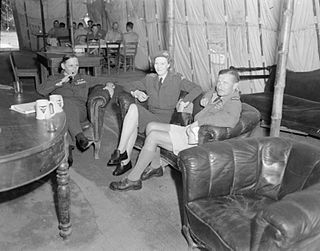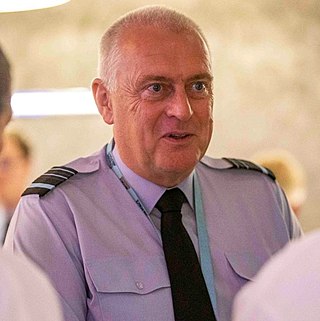Related Research Articles

Marshal of the Royal Air Force (MRAF) is the highest rank in the Royal Air Force (RAF). In peacetime it was granted to RAF officers in the appointment of Chief of the Defence Staff (CDS), and to retired Chiefs of the Air Staff (CAS), who were promoted to it on their last day of service. While surviving Marshals of the RAF retain the rank for life, the highest rank to which officers on active service are promoted is now air chief marshal. Although general promotions to Marshal of the Royal Air Force have been discontinued since the British defence cuts of the 1990s, further promotions to the rank may still be made in wartime, for members of the Royal Family and certain very senior RAF air officers in peacetime at the discretion of the monarch; all such promotions in peacetime are only honorary, however. In 2012, the then Prince of Wales was promoted to the rank in recognition of his support for his mother, Queen Elizabeth II, in her capacity as head of the armed forces (commander-in-chief), while in 2014 Lord Stirrup, who had served as Chief of the Air Staff and Chief of the Defence Staff for over seven years, was also promoted.
Air Chief Marshal Sir John Alexander Carlisle Aiken, was a senior Royal Air Force (RAF) officer, and the Commander of British forces in Cyprus at the time of the Turkish invasion of the island in 1974.

Air Chief Marshal Sir Richard Edward Johns, is a retired senior Royal Air Force commander. He was a fighter pilot in the 1960s, commanding officer of a squadron during the 1970s and a station commander in the 1980s. Johns served as one of three British directors of operations on the senior planning staff for Operation Granby in 1991 and then acted as a supporting commander for joint operations in the Balkans in 1994. As Chief of the Air Staff he advised the British Government on the air force aspects of the Strategic Defence Review and on NATO's air campaign in Kosovo.

Marshal of the Royal Air Force Sir Andrew Henry Humphrey, was a senior officer in the Royal Air Force. He fought in the Second World War as a fighter pilot taking part in the Battle of Britain and also took part in the withdrawal from Aden in November 1967. He served as the Chief of the Air Staff advising the new Labour Government on the implementation of their latest Defence Review. He then served as Chief of the Defence Staff but caught pneumonia within three months of taking office and died shortly afterwards.
Air Chief Marshal Sir Michael James Graydon, is a retired Royal Air Force (RAF) officer. He was a fast jet pilot in the 1960s, a squadron commander in the 1970s and a station commander in the 1980s before serving as Air Officer Commanding-in-Chief RAF Strike Command during the Gulf War. He was Chief of the Air Staff from 1992 to 1997, in which role he advised the British Government on the implementation of No Fly Zones in Iraq and Bosnia and implemented the Front Line First initiative.

Air Chief Marshal Sir Glenn Lester Torpy, is a retired senior Royal Air Force (RAF) commander. He was a fast jet pilot in the late 1970s and 1980s, saw active service during the Gulf War and then went on to higher command. He was the air component commander on Operation Telic and served as Chief of the Air Staff, the professional head of the RAF, from 2006 to 2009. In that role Torpy hosted the RAF's biggest air display in two decades, and argued for consolidation of all British air power in the hands of the RAF.

Marshal of the Royal Air Force Sir William Forster Dickson, was a Royal Naval Air Service aviator during the First World War, a senior officer in the Royal Air Force during the inter-war years and a Royal Air Force commander during and after the Second World War. Dickson was Chief of the Air Staff in the mid-1950s, in which role his main preoccupation was the establishment of the V Force and the necessary supporting weapons, airfields and personnel. He also served as the first Chief of the Defence Staff in the late 1950s.

Marshal of the Royal Air Force Neil Cameron, Baron Cameron of Balhousie, was a senior officer in the Royal Air Force. He fought in the Second World War as a fighter pilot taking part in the Battle of Britain, the Battle of Alam el Halfa, the First Battle of El Alamein and the Second Battle of El Alamein and then in operations in Burma. He served as Chief of the Air Staff in the late 1970s advising the British Government on the reinforcement of the British garrison in Belize which was under threat from Guatemala at the time. He also served as the Chief of the Defence Staff at the end of the 1970s in which role he secured pay comparability for services personnel involved in civil support during the firemen's strike, visited the People's Republic of China and lectured extensively on the Soviet air threat.
Air Chief Marshal Sir Joseph Charles French,, often known as Sir Joe French, is a retired senior Royal Air Force officer who was the last Air Officer Commanding-in-Chief RAF Strike Command (2006–07).
Air Chief Marshal Sir Nigel Martin Maynard, was a senior Royal Air Force commander.

Air Chief Marshal Sir Hugh William Lumsden Saunders, was a South African aviator who rose through the ranks to become a senior Royal Air Force commander.
Air Chief Marshal Sir Anthony Wilkinson Heward, was a senior Royal Air Force (RAF) commander.

Air Chief Marshal Sir Lewis Macdonald Hodges, was a pilot for Special Operations Executive (SOE) in the Second World War, and later achieved high command in the Royal Air Force and NATO.

Air Chief Marshal Sir Robert Mordaunt Foster, was a Royal Flying Corps pilot in the First World War, and a senior commander in the Royal Air Force during the Second World War and the immediate post-war years.

Air Marshal Sir Richard Frank Garwood, is a retired senior Royal Air Force officer.

Air Marshal Sir Barry Mark North, is a retired senior Royal Air Force officer, who served as Deputy Commander (Personnel) at RAF Air Command. A helicopter pilot, North has held command appointments at all levels, notably No. 78 Squadron in the Falkland Islands, the Special Forces Flight as a squadron leader and the newly established No. 83 Expeditionary Air Group in the Middle East as an air commodore.
Air Chief Marshal Sir Michael James Douglas Stear, was a senior commander of the Royal Air Force (RAF). He served as Deputy Commander in Chief, Allied Forces Central Europe from 1992 to 1996.

Air Chief Marshal Sir Andrew Douglas Pulford, is a retired senior Royal Air Force (RAF) commander. A helicopter pilot with operational service in Northern Ireland, the Falklands War and Iraq War, Pulford commanded RAF Odiham and No. 2 Group, and served as Assistant Chief of Defence Staff Operations, before taking up the post of Deputy Commander-in-Chief Personnel at Air Command and Air Member for Personnel in 2010. He became Chief of the Air Staff on 31 July 2013, retiring from the Royal Air Force on 12 July 2016.
Air Marshal Sir John Robert Walker, is a former Royal Air Force officer who served as Chief of Defence Intelligence from 1991 to 1994.

Air Chief Marshal Sir Stephen John Hillier, is a retired senior Royal Air Force officer, who served as Chief of the Air Staff from 2016 to 2019. He was awarded the Distinguished Flying Cross for actions in the Gulf in 1999 and was awarded the United States Bronze Star Medal for service in the Iraq War. He went on to be Air Officer Commanding No. 2 Group, Director Information Superiority at the Ministry of Defence, Deputy Chief of the Defence Staff (Capability) and finally Chief of the Air Staff from July 2016. He was appointed chair of the Civil Aviation Authority in 2020.
References
- ↑ The Commanding Officers of II(AC) Squadron Archived 2 October 2011 at the Wayback Machine
- ↑ Defence Flight International, 26 June 1976
- ↑ Air of Authority – A History of RAF Organisation – RAF Station Commanders – Scotland, North-East England and Northern Ireland
- ↑ "No. 52563". The London Gazette (Supplement). 14 June 1991. p. 3.
- ↑ Air of Authority – A History of RAF Organisation – Air Council Appointments 1 Archived 1 November 2011 at the Wayback Machine
- ↑ "No. 54167". The London Gazette (Supplement). 25 September 1995. p. 12997.
- ↑ "Ousting of RAF chief was fair, say officers". Independent.co.uk . 11 February 1995.
- ↑ Evans, Michael (10 February 1995). "Rifkind forces air chief to quit over renovations". The Times. No. 65187. p. 1. ISSN 0140-0460.